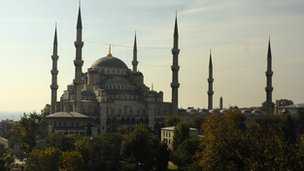By Emre Peker
ISTANBUL–Turkey’s most popular food is in trouble.
On Thursday, Prime Minister Recep Tayyip Erdogan turned his attention for a brief moment to bread: the backbone of every meal in Turkey, where bakers put out 37 billion loaves a year.
The premier said wasting bread is tantamount to greed, which lies at the root of economic crises and wars. Turkey, he said, can’t afford to squander 2 billion loaves of bread annually while the country needs to encourage savings and millions worldwide suffer from hunger.
That catapulted the puffy white loaves of dough, which are not nutritious but filling and rich in flavor, into the center of political debate. It also brought Mr. Erdogan, who is ever-present in the lives of Turkey’s 75 million people but not known for culinary curiosity, into the kitchen.
“From now on, we must enter a new period in the business of bread. Let’s remove the so-called white bread from our tables, let’s produce pure, genuine wheat bread, and in addition, let’s bring to the table bread with a high ratio of bran in it,” Mr. Erdogan said in Ankara.
The prime minister’s comments came after a flurry of media reports that private-equity firms including Dubai-based Abraaj Capital and Colony Capital from the U.S. are seeking a 50% stake in Simit Sarayi, Turkey’s top baker of yet another dietary staple: the simit, a local bagel donned with sesame seeds. While the company’s chairman said Simit Sarayi wouldn’t consider offers below $500 million, the valuation seems half-baked at best, people familiar with the talks said.
To be sure, Mr. Erdogan’s comments let simit off the hook as he sought to fine-tune Turkey’s habits and preferences. And this isn’t the prime minister’s first foray into health matters.
An avid opponent of cigarettes, Mr. Erdogan has pushed a smoking ban in Turkey in 2008. The prime minister often solicits smokers to quit, collecting their cigarette packs with a date and signature to mark a pledge to stop smoking.
In a more controversial health-care move, the government pushed through limitations to Caesarian section births after Mr. Erdogan said in May that he is opposed to the procedure. The premier is also against abortions, which he says is a ploy to stunt Turkey’s economic growth, but the government hasn’t yet pushed legislation on that issue.
Indeed, the health-conscious prime minister’s argument wasn’t strictly related to the public diet. Mr. Erdogan also said Turkey can pay minimum wage salaries to more than 100,000 people or build 500 schools with the money it squanders on wasted bread.
Thus, the premier joined other officials to encourage a higher savings ratio and build domestic resources for financing Turkey’s economic growth. Currently, the country relies heavily on international funding as it seeks to expand the $800 billion economy by 5% annually to join the world’s top-10 economies in the next decade.
“We need to be a nation that gets richer as it saves, and saves as it gets richer,” Mr. Erdogan said. “From time to time, we see those who wipe their lips with leftover bread, we cannot be like them.”
via Turkey’s Premier Spells Out Trouble for Most Popular Food: Bread – Emerging Europe Real Time – WSJ.




